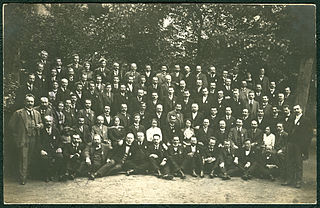Clerk

The clerk (colloquially trading assistant ) is in the economic one to power commercial services in a commercial enterprise employee .
General
Originally the expression referred to an unskilled worker in the commercial sector, today it is still used as a job title in Germany . Otherwise one speaks generally of commercial employees .
Legal issues
Like the trainee , the clerk is regulated by law in the sixth section of the first book of the Commercial Code (HGB). Section 59 sentence 1 of the German Commercial Code (HGB) contains a legal definition , according to which an assistant is "who is employed in a trade to provide commercial services for remuneration."
In the absence of an individual agreement ( employment contract in accordance with § § 611 ff. BGB ), the clerk must provide the customary services and may claim the customary remuneration (§ 59 sentence 1 HS. 2 HGB). A statutory prohibition of competition is particularly regulated , according to which the sales assistant may only do business for his own account or for the account of a third party with the consent of the businessman ( employer ) ( § 60 f. HGB). In return, the employer has a duty of care ( Section 62 HGB). In case of doubt, the clerk must provide his services personally ( Section 613 sentence 1 BGB).
An agreement between the merchant and the clerk that restricts the clerk in his commercial activity for the time after the employment relationship has ended (non-competition clause ) must be in writing ( Section 74 (1) HGB).
Economical meaning
The intellectual activity must predominate in the sales assistant, so that predominantly non-commercial, industrial, scientific or artistic activity and technicians or engineers are no sales assistants. Only a small percentage of employees are clerks, but the regulations are in part applied to the other employees through case law and literature, such as the non-competition clause or the duty of care.
Web links
- Literature about clerks in the catalog of the German National Library
- German HGB - as of 1897
Individual evidence
- ↑ Formally, the trade regulations 1859 are still in force in Austria , which defines the clerks as unskilled workers or industrial auxiliary staff , but the term no longer appears as a professional title. Imperial patent dated December 20, 1859, with which a trade regulation for the entire extent of the empire, with the exception of the Venetian administrative area and the military frontiers, is enacted, and came into effect on May 1, 1860 (trade regulation 1859 - industrial auxiliary staff) . StF: RGBl. No. 227/1859 as amended on August 14, 2011 ( ris.bka , pdf)
- ↑ Lutz Michalski, Exercises in Commercial and Company Law: Commercial Law , 1995, pp. 84 ff.
- ↑ Lutz Michalski, Exercises in Commercial and Corporate Law: Commercial Law , 1995, p. 85